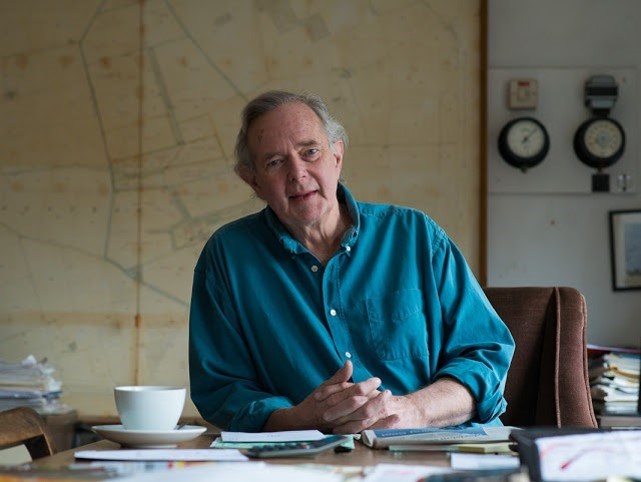I decided to begin my explorations in this area [how to feed the world and replenish the soil] by seeking to understand the perspectives of an organic farmer, and so turned to Lord Peter Melchett, then policy director of the Soil Association, a long-standing and much-loved advocate of organic agriculture as the best and most sustainable means of feeding the world.
Peter was once a Labour politician in the Harold Wilson government and subsequently campaigned for Greenpeace, becoming famous for uprooting genetically modified (GM) maize crops under trial in the late 1990s. Peter invited me to his organic farm in Norfolk during the summer of 2016 for a day’s walk through his flower-lined fields.

And so it was that I found myself in Courtyard Farm, Peter’s family farm in the heart of Norfolk, where he is proud to have built up the carbon content of his farm’s soils over 15 years, with the records to prove it.
By careful application of organic and ecological agricultural approaches, soil organic matter had gone up by a factor of two and a half times since he converted the farm to a fully organic system, with the trend set to continue. On a long walk through the fields, we came across Peter’s son driving a tractor; father and son compared notes on how the fields were faring in light of the recent weather. Peter explained how he avoids artificial pesticides or fertilisers, and provides a habitat for wildlife by protecting riparian borders and cultivating wildflower meadows, clover fields and areas of natural beauty to benefit insects and native plants which in turn attract mammals and birds.

Peter’s clover fields – “usually now a mixture which is mainly red clover, with some white clover, and other nitrogen-fixing legumes like trefoil and vetch” – are an essential means of putting nutrients back into the soil. Energy from the sun allows the clovers (as well as the peas and beans) to fix nitrogen in their roots, vital for crop-growing. After growing under a wheat crop for one year – really just at ground-level, and nowhere near the height of wheat – the clover remains undisturbed for another two years to maximise the nitrogen-fixing.
The clover fields are then cut for silage, to feed the cattle in winter, or to be grazed by young cattle in the summer; the pigs are also put on the fields during the final year. Over the winter, the farm grows a cover crop, usually mustard or vetch, to prevent any soil erosion and to maintain the nutrients for the next crop to be planted in the spring. The farm grows wheat, barley, beans, peas and red clover in a six-year rotation.
The peas and beans are used primarily for animal feed (thereby substituting soya grown in the Brazilian Cerrado); the wheat for animal feed or to be milled for biscuits and bread; and the barley for beer malting or for animal feed.
At the end of our walk, Peter showed me the three small 5-kilowatt wind turbines installed on the central site of Courtyard Farm, sufficient to run all the farm’s buildings and operations, and I thanked him for a wonderful lesson in the joys and benefits of a system which, in Peter’s devoutly held view, is sufficient both to feed the planet and to meet our climate and biodiversity goals at the same time.
Edward Davey is a project director at the World Resources Institute and has worked for The Prince of Wales’s International Sustainability Unit on global environmental issues, leading the organisation’s work on forests and climate change. Given Half a Chance is his first book, out April 2019 and sold through online bookshop Wordery.
Given Half a Chance is both a snapshot of our world and a call to arms, setting out the most pressing environmental challenges that we face while making a passionate case for why we need to meet them. From fields of solar panels in Nevada to the flourishing agricultural landscapes of Ethiopia; from the traditional water harvesters of northern Rajasthan to Britain’s inspiring waste campaigners; from the savannas of Northern Kenya teeming with elephants to the clear skies above Scandinavian cities, amazing things are happening right now across the world. The challenge before us is to go to scale and to replicate these successful approaches elsewhere, fast: this book draws on firsthand experience and interviews with many of the world’s leading experts to show how.












0 Comments